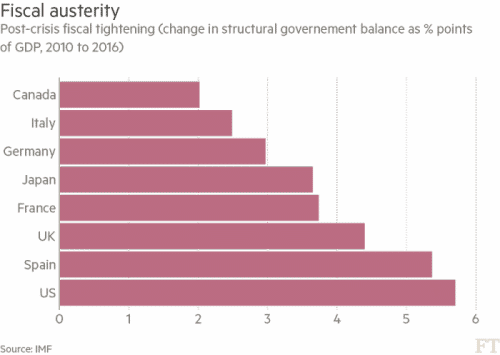I’ve pointed this out before, but it bears repeating: despite the large buildup in US government debt under Obama, the Obama administration ran a pretty restrictive monetary policy. In fact, compared to the other large, developed economies, Obama actually had the most restrictive post-crisis fiscal stance.

I think this makes sense if you listen to comments by Obama’s last Treasury Secretary Jack Lew about the Republican tax cuts. He says, “It’s a ticking time bomb in terms of the debt.â€Â
On its face, this comment is laughable since the US government creates dollars — especially given my view that, if you actually wanted to win an election like the upcoming US mid-terms, you don’t do it by opposing tax cuts on the grounds that, “It’s a ticking time bomb in terms of the debtâ€. That’s actually a losing strategy. What you’re supposed to say is this: “we will be responsible by looking at spending line by line and eliminating every wasteful program. On taxes, we want to lower taxes too. But these are the wrong tax cuts to make.â€
But of course, Lew didn’t say that. And a lot of other Democrats aren’t saying that. They are banging their fists on the table, screaming about the deficit.
Meanwhile, the Republicans just passed a tax cut that will give cuts in the first few years to just about everybody that matters in states important to their electoral chances. The potential electoral benefits are so large that, despite the Trump millstone, Democrats are worried and threatening to sue based on the tax bill ‘illegally harming blue states’. Moreover, on average, every income quintile gets a cut. It’s only later when some of those tax cuts get unwound and taxes start to go up for the middle class on average. Corporations and the wealthy get to keep their tax benefits. Pretty crafty, huh?
As far as the mid-terms go, the Republicans have a pretty good strategy. Democrats talking about deficits don’t.

